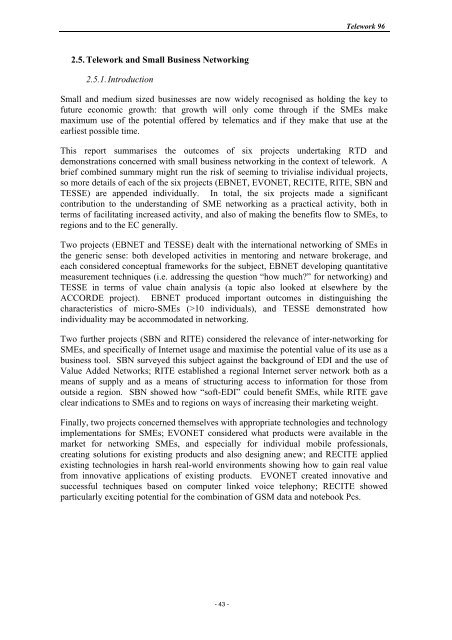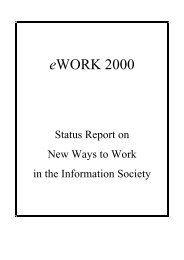1996 - European Telework Week
1996 - European Telework Week
1996 - European Telework Week
- No tags were found...
You also want an ePaper? Increase the reach of your titles
YUMPU automatically turns print PDFs into web optimized ePapers that Google loves.
<strong>Telework</strong> 96<br />
2.5. <strong>Telework</strong> and Small Business Networking<br />
2.5.1. Introduction<br />
Small and medium sized businesses are now widely recognised as holding the key to<br />
future economic growth: that growth will only come through if the SMEs make<br />
maximum use of the potential offered by telematics and if they make that use at the<br />
earliest possible time.<br />
This report summarises the outcomes of six projects undertaking RTD and<br />
demonstrations concerned with small business networking in the context of telework. A<br />
brief combined summary might run the risk of seeming to trivialise individual projects,<br />
so more details of each of the six projects (EBNET, EVONET, RECITE, RITE, SBN and<br />
TESSE) are appended individually. In total, the six projects made a significant<br />
contribution to the understanding of SME networking as a practical activity, both in<br />
terms of facilitating increased activity, and also of making the benefits flow to SMEs, to<br />
regions and to the EC generally.<br />
Two projects (EBNET and TESSE) dealt with the international networking of SMEs in<br />
the generic sense: both developed activities in mentoring and netware brokerage, and<br />
each considered conceptual frameworks for the subject, EBNET developing quantitative<br />
measurement techniques (i.e. addressing the question “how much” for networking) and<br />
TESSE in terms of value chain analysis (a topic also looked at elsewhere by the<br />
ACCORDE project). EBNET produced important outcomes in distinguishing the<br />
characteristics of micro-SMEs (>10 individuals), and TESSE demonstrated how<br />
individuality may be accommodated in networking.<br />
Two further projects (SBN and RITE) considered the relevance of inter-networking for<br />
SMEs, and specifically of Internet usage and maximise the potential value of its use as a<br />
business tool. SBN surveyed this subject against the background of EDI and the use of<br />
Value Added Networks; RITE established a regional Internet server network both as a<br />
means of supply and as a means of structuring access to information for those from<br />
outside a region. SBN showed how “soft-EDI” could benefit SMEs, while RITE gave<br />
clear indications to SMEs and to regions on ways of increasing their marketing weight.<br />
Finally, two projects concerned themselves with appropriate technologies and technology<br />
implementations for SMEs; EVONET considered what products were available in the<br />
market for networking SMEs, and especially for individual mobile professionals,<br />
creating solutions for existing products and also designing anew; and RECITE applied<br />
existing technologies in harsh real-world environments showing how to gain real value<br />
from innovative applications of existing products. EVONET created innovative and<br />
successful techniques based on computer linked voice telephony; RECITE showed<br />
particularly exciting potential for the combination of GSM data and notebook Pcs.<br />
- 43 -








